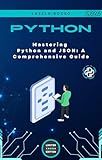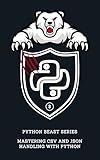Best JSON Processing Tools to Buy in February 2026

Mastering Python and JSON: A Comprehensive Guide: From Basics to Advanced Techniques: Parsing, Manipulating, and Creating JSON Data with Python (Micro Learning | Python Book 4)



Mastering CSV and JSON Handling with Python (Python Beast Series: Mastering the Code Jungle Book 8)


To read only specific fields of a nested JSON file in pandas, you can use the pd.json_normalize() function along with the record_path and meta parameters.
First, load the JSON file using pd.read_json() and then use the pd.json_normalize() function to flatten the nested JSON data. Specify the record_path parameter to specify the path to the nested field you want to extract, and the meta parameter to select additional fields to include in the resulting DataFrame.
For example, if you have a nested JSON file with a field named 'data' containing the nested data, and you only want to extract specific fields within the nested data, you can use pd.json_normalize(data, record_path=['data'], meta=['field1', 'field2']) to read only the specified fields from the nested JSON file. This will create a DataFrame with only the selected fields from the nested data.
How to filter out unwanted fields from a JSON file in pandas?
To filter out unwanted fields from a JSON file in pandas, you can use the drop method or the filter function. Here's how you can do it:
Using the drop method:
import pandas as pd
Load the JSON file into a pandas DataFrame
df = pd.read_json('your_json_file.json')
Drop unwanted fields
unwanted_fields = ['field1', 'field2'] df = df.drop(unwanted_fields, axis=1)
Save the filtered DataFrame to a new JSON file
df.to_json('filtered_json_file.json')
Using the filter function:
import pandas as pd
Load the JSON file into a pandas DataFrame
df = pd.read_json('your_json_file.json')
Filter out unwanted fields
unwanted_fields = ['field1', 'field2'] df = df.filter(items=[col for col in df.columns if col not in unwanted_fields])
Save the filtered DataFrame to a new JSON file
df.to_json('filtered_json_file.json')
In both cases, replace 'your_json_file.json' with the path to your JSON file and 'filtered_json_file.json' with the path where you want to save the filtered JSON file. Adjust the list of unwanted_fields to include the names of the fields you want to filter out.
How to deal with nested structures and extract specific fields from a JSON file in pandas?
To deal with nested structures and extract specific fields from a JSON file in pandas, you can follow these steps:
- Load the JSON file into a pandas DataFrame using the pd.read_json() function.
- If the JSON file contains nested structures, you can use the json_normalize() function to flatten the nested structures into a DataFrame.
- Use the square bracket notation to extract specific fields from the DataFrame.
Here is an example code snippet:
import pandas as pd from pandas.io.json import json_normalize
Load the JSON file into a DataFrame
data = pd.read_json('data.json')
Flatten the nested structures
data_flat = json_normalize(data['nested_field'])
Extract specific fields
specific_fields = data_flat[['field1', 'field2', 'field3']]
print(specific_fields)
In this code snippet, data is a DataFrame that contains the nested field nested_field. We use the json_normalize() function to flatten the nested_field into a DataFrame called data_flat. We then use the square bracket notation to extract specific fields (field1, field2, field3) from the data_flat DataFrame.
You can modify the code snippet based on the structure of your JSON file and the specific fields you want to extract.
What are some alternatives to pandas for extracting specific fields from a JSON file?
- JSONPath: JSONPath is a lightweight library that allows you to extract specific fields from a JSON file using a simple query language similar to XPath.
- jq: jq is a lightweight and flexible command-line tool for parsing and manipulating JSON data. It allows you to filter and extract specific fields from a JSON file using a simple query language.
- Python json library: You can use the built-in json library in Python to load a JSON file and extract specific fields using dictionary indexing and iteration.
- Ruby JSON library: Ruby also has a built-in JSON library that allows you to parse and extract specific fields from a JSON file using hash indexing and iteration.
- JavaScript: If you are working with JSON data in a web browser or Node.js environment, you can use the built-in JSON parsing functions to extract specific fields from a JSON file.
